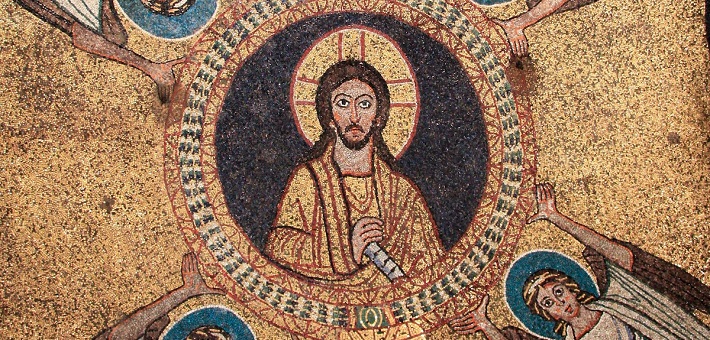Commentary on Daniel 7:9-10, 13-14
What is your spatial metaphor for heaven? Many of the Christian depictions of heaven draw inspiration from these verses from the book of Daniel. God is a wise, old but vigorous, male king, enthroned above the host of heaven. He defeats monsters and delegates a regent to rule over all of humanity. That regent now adheres to Jesus as celebrated in the Christian liturgical calendar on the feast of “Christ the King.”
The image in Daniel is grounded in political, colonial discourse. It is, in fact, the discourse of empire. The “Ancient One” functions as emperor who has conquered various nations and peoples. The battle with a “beast” represents this emperor’s defeat of another empirical power and the re-assignation of those conquered territories to his own chosen rulers. For the author(s) of Daniel, this scenario equally mirrors Persia’s defeat of Babylon and Greece’s defeat of Persia.
In its historical context, the “one like a human being” or “son of man” functions as a colonized king, who has been put on or left on the throne of a conquered nation and serves as the conduit between the emperor and his vast lands. Because in Daniel this emperor is divine, his sub-regent is also a divine being, although certainly one of a considerably lower rank. This is why the text does not describe him as a human but as a being that resembles one. Later in the book, this figure is identified as “Michael,” who is considered to be an archangel in the Christian tradition.
I don’t know about you, but my metaphor for heaven would not be that of a colonizing empire. I suppose if one is going to have an empire, it is best if God is the emperor, but even my cognitive associations with the word “emperor” do not match well with my experience of God. Even more, I find the metaphor rather unsuitable for Jesus who seems to have openly rejected the title of “king.”
The political imagery permeates this whole passage, including the heavenly sentencing court with its written records of judgment. Later in Daniel, the “books” seem to be already written, so that the fate of the accused is determined before a transgression is committed. Such a judicial system does not seem wise to me; it feels punitive and unfair.
What do we do with Daniel 7 in the contemporary world, where our own communal biases that have led to an unfair judicial system have risen into plain view? And what in the world do we do with a Jesus cloaked in absolute power, whose main activity is that of dominion? It makes me want to walk out the door. I mean, a benevolent dictator might sound theoretically blissful, but frankly, I don’t trust it.
No, I would rather read Daniel 7 as an invitation to use our imagination. It is not a decree to follow slavishly their historically contextualized metaphors. They wrote as a people who had been colonized by the Persian and Greek emperors. For them this vision subverts the earthly power by co opting the images used to push them into subservience and transferring them to their God, the “Ancient One.” That God’s co-optation of empire in this dream sequence will be accomplished through defeating the human emperors and taking over their claim to worldly power. It might be their version of storming the Capitol (which we now realize has very different meanings depending on who is doing the storming).
When I was a very young girl, I asked my Mom what heaven is like. She said, “It is the best place you can imagine.” I thought about that, and having recently returned from vacation, I responded, “Is it like Disneyland?” Lucky for this budding theologian, she smiled and said, “If that’s the best thing you can imagine, then that is what it is.”
Daniel 7 does not require us to stay stuck in its images of a perfect world. Instead, it is in an invitation. What kind of space would be our metaphor for heaven? What kind of social structure would it have? Certainly, that reimagining clings to traditions about Jesus, where the kingdom is one of radical hospitality. Maybe we should even start thinking about changing this feast day from “Christ the King” to “Jesus the Welcomer.” It is not that we want a weak God; I certainly appreciate divine otherness! But the political metaphors have become so tainted by the history of our own human sinfulness that for many of us, they cannot be redeemed.
The Bible does not expect us to stay stuck in the ancient world. This amazing ancient fantasy literature invites us to engage our own metaphors that capture God’s goodness and otherness.


November 21, 2021